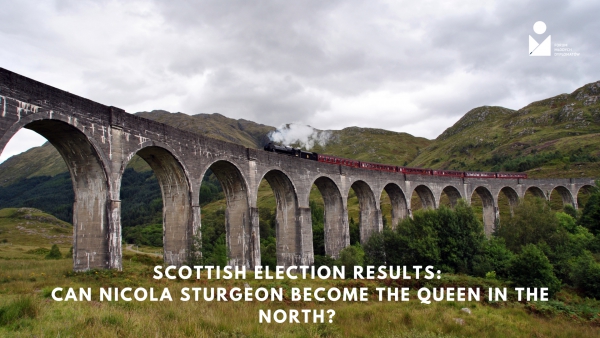While the blue tide sweeps up the remnants of Labour's "Red Wall" in England's local elections, Scotland is - once again - painting itself yellow.
On Saturday, May 8, the results for Scottish Parliament elections were declared. The SNP, led by Nicola Sturgeon, took their fourth consecutive victory, claiming 64 seats in Holyrood. Sturgeon will therefore remain prime minister, continuing the SNP's dominance in Scottish politics since 2007. Although the nationalists came one seat short of achieving the majority, they can count on the support of eight Scottish Greens, who also support the cause of the second independence vote. Thus, the “freedom faction” has gained a stable majority in Scottish legislative.
The issue of the second referendum has become a focus of this year's campaign. Back in 2014, more than half of Scots - mostly convinced that Britain would stay in the European Union - voted against secession. The SNP and the Greens went to the elections under the banner of the second vote and Nicola Sturgeon has repeatedly emphasized that she will strive for another referendum as soon as the pandemic containment allows it. The SNP leader expects the UK Prime Minister Boris Johnson to challenge the referendum decision in the Supreme Court. According to Sturgeon, this would mean “not picking a fight with the SNP, [but](…) picking a fight with the democratic wishes of the Scottish people”.
In opposition to the SNP, the all-British parties emphasized that the current priority for Scotland is to fight the pandemic, which is made easier by concerted efforts of the entire UK (among other things, support from the British army in the distribution of vaccines was highlighted). The Tories and Labour, in a rare act of inter-party solidarity, encouraged their voters to vote tactically in order to stop SNP in their tracks. Although the pandemic clearly cooled the longing for self-determination (from a record 58% in October 2020 to around 49% on election day), the Unionists failed to prevent the SNP-Green majority. Tories maintained their 31 seats, but Labour (22) and the Lib-Dems (4) lost 3 between them.
Nicola Sturgeon has gained a strong hand in her game with Westminster. With a stable majority, and the initiative on her side, she can patiently wait for the right moment to push through with the referendum. There is no need to rush - two lost votes in such a short time would bury the cause of Scottish nationalism for decades. The narrative of joined COVID fight and fears of economic recovery should hold back the aspirations for independence, but already only 27% of Scots attribute successes in fighting the pandemic to Westminster, and as many as 64% - to the Scottish government. The SNP deftly discounts the political gains from the pandemic – it even offers protective masks that help support the cause even as one covers their mouth and practices social distancing.
The Greens have also came out as big winners. Before the elections, the SNP promised them a coalition even if it manages to secure the majority. The support of 8 Greens will be necessary to push for a second referendum, but this alliance also legitimizes the pro-ecological turn within the SNP itself.
Boris Johnson has little reason to celebrate. Due to the traditionally poor result of the Scottish Tories, he cannot count on blocking a referendum motion in Holyrood, and he would likely have to challenge it before the Supreme Court. Such a brutal solution could exacerbate tensions in the already troubled Northern Ireland and even raise a few eyebrows in Wales, where the centre-left nationalist Plaid Cymru also slightly improved its standing in the Senedd. While Johnson is likely to win the case before the Supreme Court, such a judgment would reinforce the narrative of unequal treatment of Scotland within the UK.
Johnson's hope lies in chipping away at the support for independence and so discouraging the SNP from ever taking the risk. To this end, PM announced a summit with Sturgeon and other leaders of devolved parliaments. The official topic is to coordinate the COVID response, but strengthening the unionist message is no less important. Sturgeon confirmed her participation, but highlighted that Westminster's actions could lead Scotland "in a direction we do not want to go".
Johnson is not a politician known for his ability to build bridges and bring people together and the polls indicate that Scots have particular distaste for him. At the same time, the next 5 years of free rule in Scotland give the SNP an excellent opportunity to further promote their agenda. After almost 20 years of uninterrupted rule by a left-wing, pro-European and pro-ecological independence party, by 2026 Scotland could drift away even further from the Tory-dominated England.
Author: Maciej Lipiński

